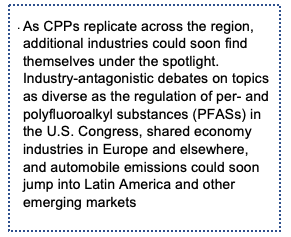- Home
- / Insights
- / FTI Journal
- / One Regulatory Size Doesnt Fit Emerging Markets
One Regulatory Size Doesn’t Fit All in Emerging Markets

-
January 21, 2020
-
How multinationals can stay ahead of the spread of cross-border “copy-and-paste policies” that threaten growth and development.
During the past few decades, globalization has benefitted both multinational businesses and developing countries by opening up distant and diverse markets. Governments and companies based in developed countries have effectively engaged with those in developing countries to pursue policy standardizations that provided local businesses with certainty when operating in promising, yet unreliable, emerging markets. For a while, new free trade agreements and multilateral agencies successfully standardized regulations across Latin America, Eastern Europe and Southeast Asia.
But in recent years a different kind of regulatory standardization has arisen — one that threatens businesses operating in emerging markets, causing multinationals to struggle to catch up and adapt.
This new standardization can be called cross-border “copy-and-paste policies” (“CPPs”). CPPs are usually hastily created regulations that transplant policies drafted to address the political, market and contextual realities of one country into another. Though they seem like another form of policy standardization, CPPs are a growing threat to businesses across the world as they fail to enhance business growth and development the way their predecessors intended them to do.
Catalyst for CPPS: Networks Growing Stronger
Our complicated and volatile world is fertile ground for the rise of CPPs. When viewed through the lens of Latin America, five combustible elements are present that have kindled the trend:
- A global news media that seamlessly spreads information about policy developments between countries and often compares policies in developed markets with those in emerging ones.
- An interconnected network of issue advocates that leverage the global news environment to amplify developments and exercise pressure on local governments. Comprised mostly of civil society groups such as nongovernmental organizations (NGOs), this stakeholder group has distanced itself from businesses and developed an intricate network of partnerships and alliances with similar groups and governments around the globe.
- Increased regulatory connectivity that allows bureaucrats in different geographical regions to dialogue and share their experiences with complex regulatory processes.
- A higher degree of technological complexity that makes business models increasingly difficult to understand and, therefore, properly regulate. This opens the door for policy makers to follow so-called “proven paths” (i.e., CPPs), particularly amid growing media noise and activist pressure.
- A rise in political and economic nationalism, across both developed and emerging markets, marked by strong manifestations of civil protest, that pushes regulators and legislators to pursue quick regulatory changes irrespective of likely negative impacts to industry.
Cause: The European Influence
In Latin America, “Made in Europe” is stitched into regulations across the region. Two recent examples of that powerful influence illustrate how CPPs can replicate.
The Plastics Debate
In 2019, the European Union (“EU”) approved a ban over certain single-use plastics.1 The policy comes into full force in 2021, providing plastic manufacturers and related businesses about two years to adapt.
The proposal received significant global media coverage, and within months of its enactment, countries in Latin America — like Costa Rica, Chile and Colombia — pursued a similar path.2 To further complicate matters, municipalities across Latin America drafted their own bans, which were also largely based on the EU’s draft.3 That significantly fragmented the debate across Latin America. The resources of global companies trying to keep up were thinly spread as a result.
While plastic waste is a critical issue that societies, governments and businesses alike are working to address, the speed with which one specific policy is replicating itself — even in very different places — is catching many businesses flat-footed.
Data Privacy Debuts
In May 2018, the EU passed the General Data Protection Regulation (GDPR) obligations, which provide for stronger rules on data protection and give EU citizens more control over their personal data.4 A key aspect of GDPR is that its standards apply regardless of where the data is collected — every country outside the EU must comply when handling EU citizen information.
It did not take long for countries in other regions to follow the EU and copy-paste the policy into their own regulatory frameworks. In Brazil, Latin America’s largest market, for example, a version of GDPR is slated to enter full force by early 2020.
GDPR-like regulations are also taking the rest of Latin America by storm. Argentina, Chile, Colombia and Peru (to a lesser degree) are all bringing their regulatory frameworks closer to that of the EU.5 But even though these countries are hastily pursuing GDPR-like legislation, implementation of the new policy is still pending following enactment.
Such is the case in Brazil, where Congress and then-President Michel Temer went back and forth on veto and override until a GDPR-like law was passed.6 The related policies that would allow for its execution have yet to be finalized, including funding and structure of the newly established regulatory agency, increasing uncertainty for many businesses.7
Cause: The Emerging Economies Influence
In recent years, increased communication between stakeholders in emerging economies has contributed to a different kind of cross-border CPP. An example is the case of compulsory licenses on innovative pharmaceutical patents, and the migration of this policy from Southeast Asia to Latin America.
Intellectual Property
In 2017, the government of Malaysia issued a unilateral compulsory license on an innovative treatment for hepatitis C.8 While industry rightfully protested that intellectual property infringements were behind this move, the international NGO community soon supported the initiative and encouraged other governments to follow.9
Shortly after, the compulsory license trend appeared in Latin America. The government of Colombia, for one, pushed a similar policy in 2018. Congresses of Chile and El Salvador pursued legislative changes that aimed to facilitate the issuance of compulsory licenses. In Brazil, presidential candidates called for similar actions.10 11 12 The language in all these policies and initiatives was significantly similar to that of the Malaysian law and indicative of a bigger pattern.
Stakeholders supporting these measures across Latin America were also significantly connected to each other in media coverage of their advocacy efforts. In 2018, for example, Colombian media showcased an interview with a Chilean advocate who favored Colombia’s compulsory licensing move and used Malaysia’s 2017 case as a basis for his support.13
A New Environment Demands a New Approach
These cases speak to the new Latin America in which multinational companies operate. Previously, many regulatory affairs were dealt with in private spaces within the halls of government buildings. This is no longer the case.
The following principles should guide multinationals as they prepare to address existing cross-boarder CPPs, and ideally prevent new ones from emerging.

- Have a constructive opinion and communicate it. As businesses are affected by an increasing number of regulations, business interests and positions must go beyond asking for maintaining the status quo. Governments and societies facing the challenge of regulating complex technologies expect stakeholders to approach these debates with solutions. In the absence of concrete solutions offered by businesses, CPPs become the next best approach for regulators.
- Leverage the media in industry-related policy debates. Regulations no longer get hashed out at a bipolar negotiation table where governments offer an approach and businesses get to comment on it. In this world of the past, businesses would avoid engaging the media in an effort to keep policy talks private, but public affairs have become more public. Conceding the media space to opposing interests means the concession of a significant portion of the regulatory arena and can cause negative impacts on business.
- Know when to zoom in to national battles, and when to zoom out. Businesses must be agile and know when to isolate CPP-related narratives from international debates and when to address them as a purely global phenomenon. These two tactics have advantages and disadvantages. Keeping debates within a national context is often well received by in-country stakeholders and, if appropriate, allows businesses to lobby governments to create country-specific regulations instead of copying foreign ones.
But the international nature of CPP debates can also be useful to leverage. For instance, leveraging cross-border wins in one geography against another can advance regional debates. This approach has proven successful in balancing out CPPs through positive domino effects that take businesses’ considerations into account. We refer to this as a boomerang effect.
The first wave of policy standardization that followed globalization — in the form of free-trade frameworks and multilateral agencies — proved beneficial to businesses. CPPs, however, are an unhelpful kind of “standardization” because they transplant policy designed for one country’s specific context into another without adjustment, and often too quickly. By following some basic guidelines, however, multinational companies can keep up with the trend of CPPs.
2: http://www.economiaynegocios.cl/noticias/noticias.asp?id=284624
5: https://blogs.iadb.org/conocimiento-abierto/en/data-privacy-reform-gains-momentum-in-latin-america/
6: http://www.convergenciadigital.com.br/cgi/cgilua.exe/sys/start.htm
7: https://www.statnews.com/pharmalot/2019/01/02/gilead-malaysia-hepatitis-prices/
8: https://www.statnews.com/pharmalot/2019/01/02/gilead-malaysia-hepatitis-prices/
10: https://www.statnews.com/pharmalot/2018/01/16/colombia-hepatitis-oecd-license/
11: https://www.statnews.com/pharmalot/2018/01/03/chile-compulsory-licenses-hepatitis/
12: https://www.statnews.com/pharmalot/2018/12/24/el-salvador-compulsory-licensing-pharma/
© Copyright 2020. The views expressed herein are those of the author and do not necessarily represent the views of FTI Consulting, Inc. or its other professionals.
About The Journal
The FTI Journal publication offers deep and engaging insights to contextualize the issues that matter, and explores topics that will impact the risks your business faces and its reputation.
Published
January 21, 2020
 Key Contacts
Key Contacts
Senior Managing Director
Senior Managing Director, Global Leader of Industrials


